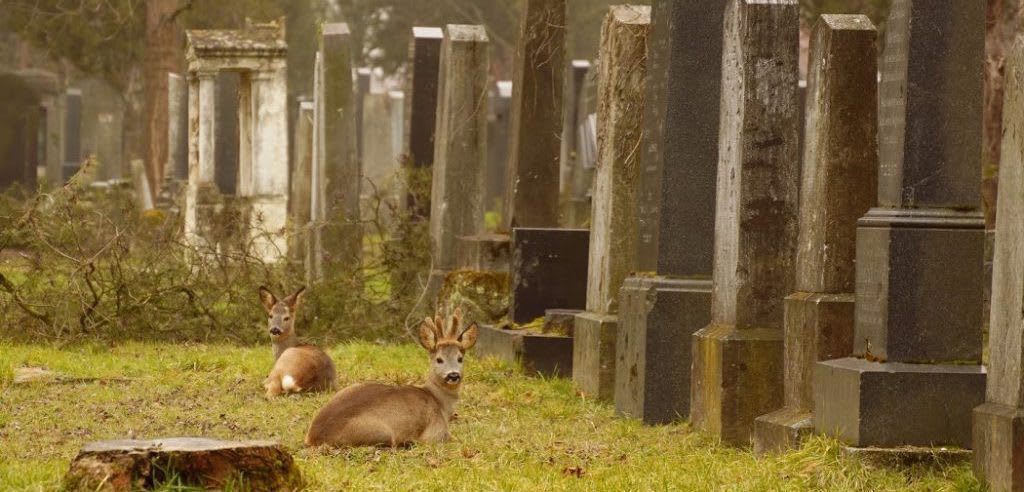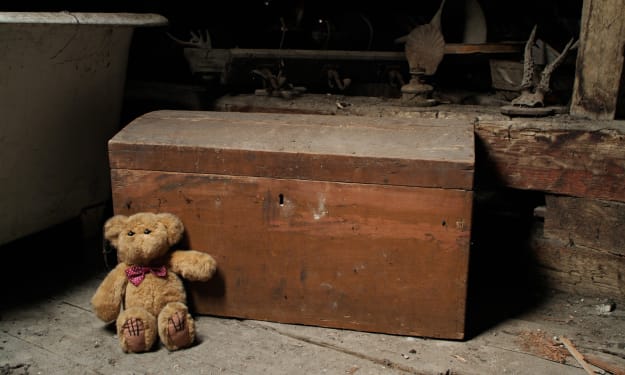The Burial Habits of Wild Dogs
J. Gossoo

Up until I was eight years old, I hadn’t had much occasion to think about death. Everyone who I knew and loved was alive, so that was the end of it.
I learned about death from the cover of a vinyl album. The lead singer of the band had shot himself in the head, and there was spatter and brain matter and shards of skull everywhere. I stood in the record store aisle and stared at that grisly cover beneath the fluorescent lights until my brother came and found me. When he saw what I was looking at, he made a face and flipped the record around.
“Come on, don’t look at that,” he said, and he steered me out of the store.
I would think about the man with the broken skull until I thought his ghost would hear my thoughts and come lurking. The notion made me want to cry. I woke my mother to tell her I’d had a nightmare, and sandwiched myself into the warm, safe space between my sleeping parents. Safe spaces dwindle as you get older.
After that, I started to see death more often (or perhaps I just hadn’t noticed it before). Doves flew head-on into clean suburban windows and died convulsing in groomed beds of rhododendrons. You could step on a spotted gecko on the sidewalk and hardly notice, or roll over and squash a house spider in your bed. I couldn’t fathom how many ants I’d crushed beneath my blundering feet, or how many innocent goldfish had been flushed in the process of a move. It made me ill.
I was watching my mother in her garden one evening; she was on her knees in the fresh earth with a pair of shears, happily severing the stalks of her daisies. She wanted to “brighten up the kitchen.” I knew that they were only flowers and that my mother was as far from a killer as they come, but as I watched the shear blades close around those sturdy green stalks, I thought that if she really loved her garden as much as she said she did, she’d leave the flowers alive.
Pretty soon the dog days rolled in and school let out; my existential crisis could not have come at a worse time.
“See, Ruben,” my father said, turning down the volume on the TV set to be heard over the narrator. He’d rented a documentary about African predators; at present, we were watching a family of cheetahs run down a herd of little African deer.
“The pudu has to die for the cheetahs to live,” my father said. “If the pudu lives, then the cheetah dies. Either way, someone has to die. Do you see?”
And I did see. It wasn’t a lack of understanding that troubled me. I knew that insects died on car windshields by the millions, and that big cats ate meat that was running and breathing and bleeding, like I would if a big cat decided to hunt me. I knew that there were coyotes writhing in cruel iron traps in some freezing wilderness, and a seal cub flopping for its life across an ice floe to escape the poacher’s club. You see, I was perfectly aware of all the death in the world - that was the problem.
My father turned off the documentary like he turned off a boring sitcom and kissed me on the head and went to bed.
- - -
I suppose it was about six dozen documentaries and one summer later; there wasn’t a single unpleasant aspect of nature that I wasn’t familiar with. I knew that orcas played catch with their prey while they were still alive, and that male lions ate the cubs of rival prides to prolong their own bloodline. I also knew that beavers mated for life, and that octopus moms protect their babies for years, and then die, and that wolves let the old and sick set the pace for the whole pack. I’d always thought that wolves were noble animals.
My grandmother was like one of those old, sick wolves. I guess that would make my family her pack. She was always being put at the head of something - dinner tables, party planning, wedding toasts. And then that summer, the nursing home called and told my dad that his mom had died in her sleep. I guess they made it sound not-so-bad, like it was an everyday occurrence, and for them it probably was. But I had never known anyone to die.
When they buried my grandmother, I thought about how dogs bury their dead to mask the smell of decay. Were we like them? I hoped my grandmother’s spirit would forgive me for thinking about the burial habits of wild dogs. I think that she probably would have found it interesting, had it been a different day and someone else’s funeral.
After the service, my wolf pack retired to our communal den. I sat on the living room floor between my father’s feet, and he was crying quietly and tousling my hair. My mom had her arm around his shoulders. I saw what death could do to the living. And I saw that there was not a single thing to be done about it. I could spend all my life ruminating on death - my own, my family’s, the man’s on the album cover - but nothing would come of it, and in the meantime, cats and dogs and grandparents and flies would keep dying, and a hundred new decaying organisms would be born only to suffer the same fate. I crawled into my father’s lap and laid my head on his chest, and he folded his warm, heavy arms around me.
It’s odd, I thought. Death only really affects the living.
About the Creator
Jennifer Ashley
🇨🇦 Canadian Storyteller
♾️ Metis Nation
🎓 UVic Alumni 2020
Writing published by Kingston Writers Press, Young Poets of Canada, Morning Rain Publishing, & the BC Metis Federation to teach Michif in Canadian schools.
✨YA Magical Realism✨






Comments
There are no comments for this story
Be the first to respond and start the conversation.